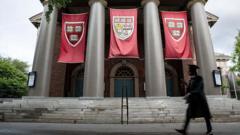Secretary of State Marco Rubio has unveiled plans to "aggressively" revoke visas for certain Chinese students, implying significant changes to immigration policies that impact both university funding and global academic collaboration.
U.S. Secretary of State Announces Visa Revocation for Chinese Students

U.S. Secretary of State Announces Visa Revocation for Chinese Students
New measures from the Trump administration to increase scrutiny of Chinese student visas alarm U.S. universities.
As concerns rise about foreign influence on national security, Secretary of State Marco Rubio declared on Wednesday evening that the Trump administration will implement a strategy to "aggressively revoke" the visas of Chinese students. This action primarily targets individuals linked to the Chinese Communist Party and those pursuing studies in "critical fields," though the specifics of these fields remain broadly defined.
This new policy is expected to create an atmosphere of uncertainty and unease on college campuses across the United States. With China being the second-largest source of international students in the nation, many universities have become financially dependent on the contributions made by these students, who often pay full tuition, contributing significantly to overall revenue. Furthermore, countless Chinese scholars play pivotal roles in scientific research within American educational institutions, enhancing both innovation and scholarly community.
While the exact timeline for the implementation of these visa revocations is still unclear, reports indicate that the State Department and the Department of Homeland Security are preparing to execute this plan. In the past, the Immigration and Customs Enforcement agency (ICE) has played an active role in apprehending students whose statuses have been revoked, leading to legal challenges against the Trump administration.
Concerns surrounding this policy are compounded by the broader narrative of national security and allegations of intellectual property theft, which have led to increased governmental scrutiny of foreign students, particularly those from China. However, current evidence does not substantiate widespread claims of U.S.-trained scientists transferring to China in significant numbers, creating a contentious backdrop for discussions about national security and immigration reform.
This new policy is expected to create an atmosphere of uncertainty and unease on college campuses across the United States. With China being the second-largest source of international students in the nation, many universities have become financially dependent on the contributions made by these students, who often pay full tuition, contributing significantly to overall revenue. Furthermore, countless Chinese scholars play pivotal roles in scientific research within American educational institutions, enhancing both innovation and scholarly community.
While the exact timeline for the implementation of these visa revocations is still unclear, reports indicate that the State Department and the Department of Homeland Security are preparing to execute this plan. In the past, the Immigration and Customs Enforcement agency (ICE) has played an active role in apprehending students whose statuses have been revoked, leading to legal challenges against the Trump administration.
Concerns surrounding this policy are compounded by the broader narrative of national security and allegations of intellectual property theft, which have led to increased governmental scrutiny of foreign students, particularly those from China. However, current evidence does not substantiate widespread claims of U.S.-trained scientists transferring to China in significant numbers, creating a contentious backdrop for discussions about national security and immigration reform.



















